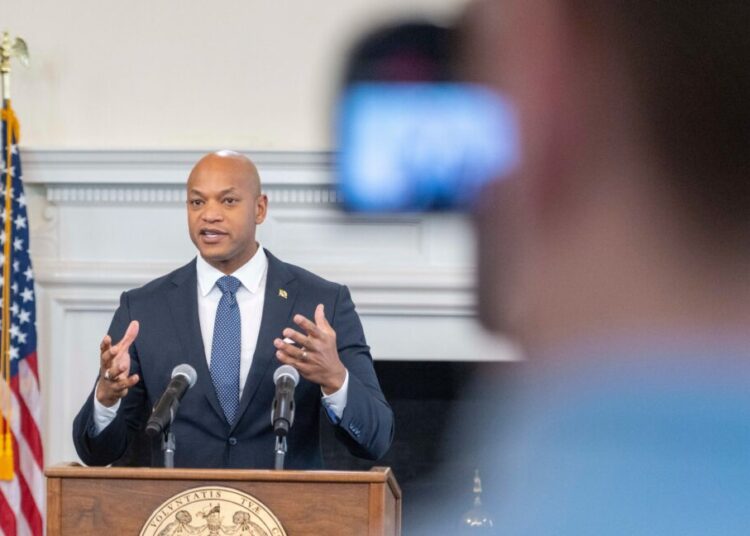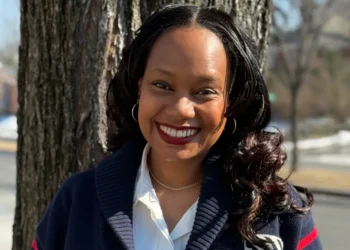
Marjorie Taylor Greene’s critics are starting to think they got her all wrong. “You are a very different person than I thought you were,” The View’s Sunny Hostin marveled last week, when the Georgia representative joined the show for a largely genial discussion. Recently, Greene has criticized the GOP’s shutdown strategy, lack of a plan to address health-care costs, and refusal to release the Jeffrey Epstein files. This turnabout has excited some liberals and media outlets, sometimes to the point of credulity.
Greene sits on the potent House Oversight and Homeland Security Committees. She has openly entertained runs for higher office, including for governor and Senate, and was recently reported to be pursuing the presidency. (She denied it.) Yet watching the softball sit-downs with her on TV, one gets the sense that Greene is being treated as a curiosity rather than as one of the most powerful people in the country, seeking even more influence.
[Read: Marjorie Taylor Greene knows exactly what she’s doing]
On the few occasions when she has been confronted with her past positions and incendiary assertions, Greene has deflected or pleaded ignorance. On The View, she disavowed the QAnon conspiracy theory, saying—as she has before—that she was misled by “media lies and stuff you read on social media.” On Real Time With Bill Maher, Greene noted that she never said that any wildfires were caused by a “Jewish” space laser, as some outlets reported. She merely tied such fire-starting technology to the Rothschild banking dynasty, a Jewish family that has been subject to countless anti-Semitic conspiracy theories. “I didn’t even know the Rothschilds were Jewish,” Greene explained with an aw-shucks shrug. “Before politics, I didn’t know much of any of this stuff.”
Fair enough. Greene was but a tender 44 years old when she invoked the Rothschilds—the same age she was when she liked a social-media comment saying that “a bullet to the head would be quicker” for getting rid of then–House Speaker Nancy Pelosi. She was practically a child—43—when she mused about executing Hillary Clinton and former President Barack Obama. But youthful ignorance doesn’t explain every conspiracy theory that Greene has advanced, and every bigot she has embraced, since she entered politics. Because some interlocutors appear to find interrogating her challenging, I thought I’d suggest some lines of inquiry for Greene’s next media appearance. You might say I’m just asking questions.
Did Donald Trump win the 2020 election? This week, the president pardoned a group of Republican activists who had acted as fraudulent electors in an attempt to overturn his 2020 loss. Greene not only applauded this decision—she called for more. This stance is nothing new. For years, Greene has denied the 2020 election results and spread false claims about the contest and its aftermath. “Today I’ll be objecting to a stolen election,” she declared on January 6, 2021, shortly before rioters stormed the Capitol and attempted to steal the election for Trump. In 2022, Greene insisted that “antifa,” not Trump supporters, was behind that abortive insurrection. In 2023, when House Minority Leader Hakeem Jeffries observed that Joe Biden had won the 2020 presidential election, Greene yelled back, “No, he didn’t.” In 2024, she spread a baseless rumor that Georgia voting machines were surreptitiously altering early votes. She has not disavowed any of these assertions.
Does Greene have any ideological differences with American white nationalists? Last month, Tucker Carlson, one of the most influential voices on the American right, hosted Nick Fuentes, one of the country’s most notorious white nationalists, on his podcast. Their conversation kicked off an intra-conservative controversy over the place of anti-Semitism and Nazi apologism in the MAGA movement. But long before Fuentes joined Carlson, Greene joined Fuentes. In February 2022, she spoke at the America First Political Action Conference, an event organized by Fuentes, where she grinningly shook hands with him onstage. Later, Greene claimed to be unaware of his views and said that she was “not aligned with anything that may be controversial,” without explaining how she, a professional politician, had come to give an address at a racist-run gathering without knowing what she was walking into. Eight months later, under media pressure, Greene declared on social media, “Of course I denounce Nick Fuentes and his racists [sic] anti-semitic ideology” (she went on to blame the media for being “obsessed” with him).
More recent events suggest that Greene’s disavowal might not have been entirely genuine. “I was a friend of hers, and she spoke at my conference, and then the day after, she pretended like she didn’t know me,” Fuentes told Carlson. “She knew exactly what it was.” Days after Carlson hosted Fuentes for that amiable exchange, in which the far-right influencer also praised Joseph Stalin and railed against “organized Jewry,” Greene slammed not Fuentes, but those criticizing “my good friend Tucker Carlson.” Given that Greene had been Carlson’s guest the week before Fuentes, this defense is not surprising. But it poses a question: Does Greene agree with either Fuentes or Carlson about Hitler, Black people, women, and the rest? Undoubtedly, she believes in the two men’s right to free speech, but will she ever use hers to criticize their specific ideas? Someone should ask.
[Yair Rosenberg: The MAGA influencers rehabilitating Hitler]
Did the COVID vaccine kill “extremely high amounts” of people? In a November 2021 social-media thread, Greene approvingly cited Louis Farrakhan, the reactionary Black hate preacher known for his homophobic rhetoric and anti-Semitic rants about the “synagogue of Satan.” The reason? Farrakhan and his Nation of Islam organization are avowedly anti-vaccine—Farrakhan once claimed that the H1N1 flu vaccine was developed to kill people—and accordingly opposed the COVID-19 vaccines. “Extremely high amounts of deaths are reported on VAERS,” the Vaccine Adverse Event Reporting System, “but there are no investigations into those deaths,” Greene claimed in that series of posts, misrepresenting the meaning of the VAERS system’s data. The merits of vaccine mandates are a matter of opinion. Whether large numbers of people were murdered by the COVID vaccine, only for their deaths to be covered up, is a question of fact—one Greene ought to be able to answer with proof, especially given her position on the House Oversight Committee.
Did Israel let the October 7, 2023, attacks happen? Many people in Congress and beyond have criticized Israel’s conduct in Gaza, myself included. But Greene has gone much further. When the conflict began, she initially sided with Israel and attempted to exploit the Hamas assault to censure the Muslim representative Rashida Tlaib for “antisemitic activity” and “sympathizing with terrorist organizations.” But since then, Greene has not only reversed course but begun insinuating something far worse than anything Tlaib ever articulated: that Israel knew about the October 7 plot in advance, yet did nothing to stop the attack.
In September, Prime Minister Benjamin Netanyahu claimed that Israeli intelligence had hijacked phones in Gaza to stream his address to the United Nations. At the time, journalists on the ground reported that they found no evidence that this had actually occurred. Nonetheless, the commentator Glenn Greenwald asked: “Israel has such complete surveillance and control of Gaza’s communications networks that it can commandeer them to force their phones to broadcast Netanyahu’s speech, but Israel had no clue that Hamas was planning an operation as large as Oct 7 and it then took hours to respond?” There are very straightforward, nonconspiratorial reasons Israel failed to repel the 2023 Hamas attack, but this did not stop Greene from reposting Greenwald’s claim with an eyeballs emoji. (Greene has also repeatedly implied that Israel had a hand in assassinating President John F. Kennedy.)
A handful of recent apostasies from her party does not negate Greene’s lifetime of conspiracies. Taken together, the above positions do not suggest a stable person of sound judgment. Rather, they paint a picture of someone consistently unable to distinguish partisan fantasy from reality, who ping-pongs from conspiratorial extreme to conspiratorial extreme. “Everybody’s like, ‘Marjorie Taylor Greene has changed,’” she said of herself on The View. “Oh no, nothing has changed about me.”
People—even politicians—should be allowed to grow and not be forever reduced to the worst version of themselves. But there is a difference between an honest evolution, which entails accountability, and shallow opportunism, which offers none. Which category does Greene fall into? Given her significant following and stated political ambitions, it’s in everyone’s best interest to find out. But for that to happen, her interlocutors will have to start asking her the hard questions she’s thus far avoided.
The post Four Simple Questions for Marjorie Taylor Greene appeared first on The Atlantic.




